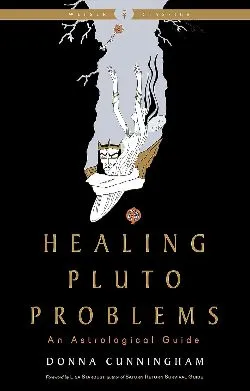
This is an interesting, fairly short book on “Pluto problems.” In astrology, Pluto is closely associated with death, transformation, and rebirth. It rules the 8th House (the “House of Death,” intimacy, and so on) and Scorpio, in modern systems, at least. I think the best way to describe Pluto is through Scorpio–it’s heavily self defensive, a bit secretive, aloof, independent, and a bit intimidating at times. It’s surely one of the most intense signs. Cunningham here is interested in the way Pluto shows up in our charts, especially when it has “hard aspects” (squares, oppositions, and sometimes conjuncts) with other placements.
My own chart has a very powerful Scorpio. Although my chart is ruled by Venus, it ties with Pluto for the most significant planet on my chart. It also has aspects with nearly all of the other planets in my chart, and I see it come up in my life quite often. I have a tendency to destroy whatever project I’m working on when I feel like it hits completion, and I always have. I have some self-destructive tendencies, although my life circumstances are–on balance–better than many others. In short, I picked up this book because I wanted to better understand myself.
For the most part, it’s decent, although I’m not sure that it goes far enough. Cunningham especially dwells on very serious, quite dark, issues. Many people who have dominant Pluto placements were victims of abuse–physical, sexual, and otherwise–and many go on to abuse others. After all, “hurt people hurt people.” In the middle of the text, she has an extended examination of the chart of a child who is being heavily abused by both parents, as well as examinations of both of their charts. I believe that, at the time of publication, this case still had not come to an end, and I pray the young boy is doing ok. It was illuminating to see how Cunningham approaches these issues through the lens of astrology, although I’m not entirely sure about the ethics of the case being in the book, given that it was still on-going.
I keep telling myself “oh God, I’m so thankful I don’t have it as bad as that.” And it’s true, I don’t, but what Freud called “Thanatos” keeps appearing in my life and I wanted to understand it better. I keep reading around this, and–this is not a commentary on the book–I don’t think it’s making it any better. Because I already know my impulses and my drive to collapse, I just feel powerless to stop them. The sentence prior to this one is a profoundly Plutonian one, and it’s exactly what Cunningham is trying to get at, but it can’t succeed because of that feeling powerless to stop it. Or, maybe I’m just participating in the same self-defeating behaviors in this review that Cunningham is talking about. It feels like a ruminative circle–a loop that just keeps repeating and repeating. Freud suggests that this repetition is unconscious, and it comes out of a desire for mastery, and I think he’s right.
To Cunningham’s credit, she does offer strategies. I found the most insightful to be the guided meditations, especially on coming to terms with the past and letting go. I suppose that the cycle is about an inability to find closure, and the cycle has to be broken by inventing the closure so desperately desired. She also offers affirmations, which I found interesting, but nowhere near as helpful. The final suggestion that Cunningham gives her readers are Bach Flower Remedies, which strike me as total “woo” (a bit hypocritical of me, I know, given that I’m reviewing an astrology book, but some “woo” seems somehow truer than others).
The last chapter, on talking to the analyzed during consultations, was especially interesting, because it allowed me to visualize how I must appear to my therapist when we discuss things that are touchy to me. To be earnest, I had never looked at myself that way before, and it’s fascinating. I don’t know if it’ll help me, but it allowed me to see something new.
I think this book is great for astrologers looking to make sense of Pluto, and it could be helpful for Plutonians who either (1) thought they were totally alone, or (2) have yet to develop a sense of self-awareness. However, Plutonians who have put their lives under the microscope won’t learn a whole lot that is new about themselves. They might feel, like I do, powerless to change their lives. To them, I suggest taking seriously the guided meditations in this book. It’s easy to be cynical in our era, but come at them with full sincerity and–although they won’t solve all your problems–they will help you.